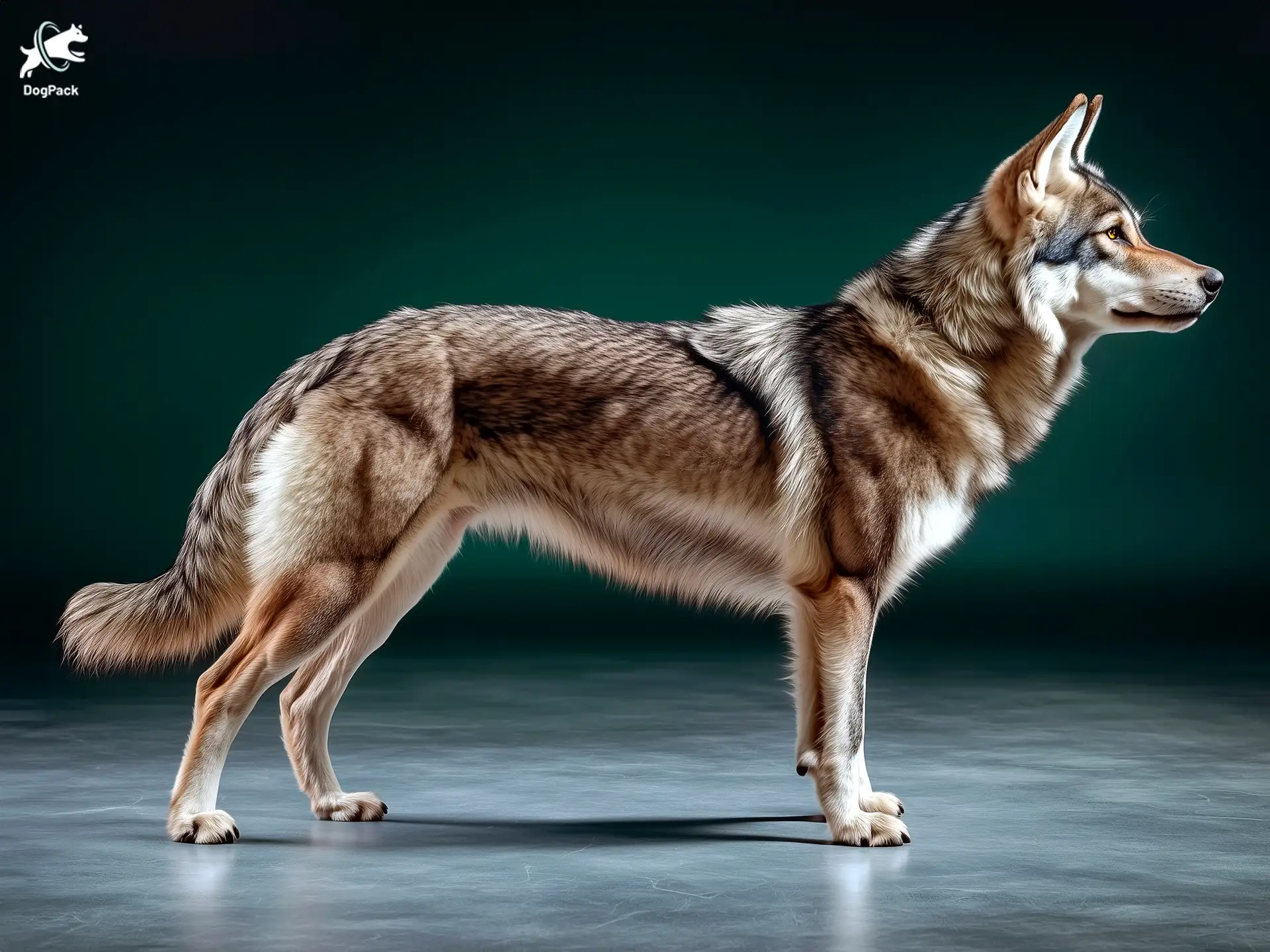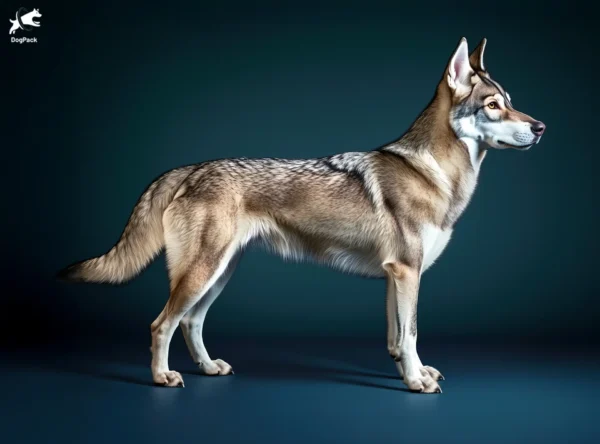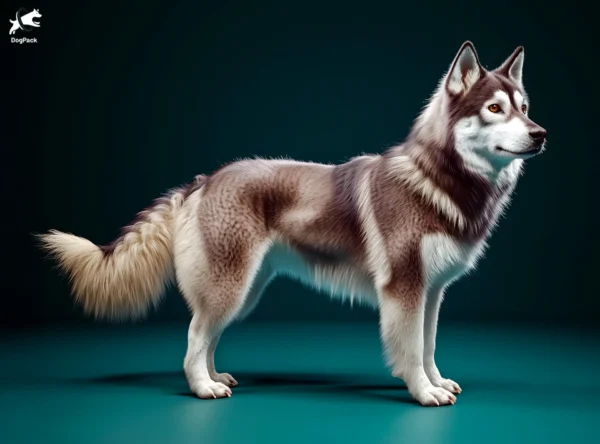American Wolfdog Dog Breed Info & Overview
The American Wolfdog is a captivating hybrid that bridges the wild and domestic worlds. With its striking appearance and wolf-like instincts, this breed embodies a sense of adventure and mystery. While they offer fierce loyalty and intelligence, owning an American Wolfdog requires dedication and understanding of their complex nature. For those ready to embrace the challenge, they provide a truly one-of-a-kind companionship experience.
Characteristics
Pictures
Breed History
The American Wolfdog traces its roots back to the intentional breeding of wolves with domestic dogs in the United States during the 20th century. The goal was to create a companion that embodies the physical prowess of a wolf with the trainability of a dog. This hybrid emerged as a unique breed, capturing the imagination of enthusiasts seeking a closer connection to the wild.
Early breeders often selected German Shepherds, Alaskan Malamutes, and Siberian Huskies for crossbreeding with wolves due to their physical similarities and working dog traits. Over time, the American Wolfdog developed its own identity, with varying degrees of wolf content influencing temperament and appearance. These hybrids became symbols of untamed beauty and complexity.
Despite its allure, the American Wolfdog’s history is also marked by controversy and legal challenges. Regulations vary widely, with some states and municipalities restricting ownership due to safety and conservation concerns. Understanding the breed’s history is essential for potential owners to appreciate the responsibilities that come with welcoming such a distinctive animal into their lives.
Temperament, Personality
American Wolfdogs are known for their intelligence and strong instincts. Their behavior can range from shy and reserved to outgoing and assertive, largely depending on their wolf content and upbringing. These hybrids require experienced handling, as their independent nature may not align with traditional canine obedience expectations.
Socialization from an early age is crucial for the American Wolfdog. They can form strong bonds with their human families but may exhibit a high prey drive, making interactions with small pets challenging. Their complex personalities demand a patient and knowledgeable owner who can provide consistent guidance.
With strangers, American Wolfdogs might display wariness or aloofness, traits inherited from their wild ancestry. They are not typically aggressive without provocation but can become protective of their territory. Understanding and respecting their natural behaviors is key to fostering a harmonious relationship.
Physical Characteristics
American Wolfdogs are impressive in stature, often standing between 26 to 34 inches tall and weighing from 60 to 120 pounds. Their appearance can closely resemble that of a wolf, featuring a lean build, dense double coat, and piercing eyes. Coat colors vary, including shades of gray, white, black, and sable.
Their physical traits are influenced by the breeds used in the crossbreeding process. Some may inherit the upright ears and bushy tails of their wolf ancestors, while others exhibit more dog-like features. The variance in appearance makes each American Wolfdog unique, adding to their allure.
Beyond aesthetics, their physical prowess includes remarkable agility and endurance. American Wolfdogs are built for running and require ample space to roam. Their strong jaws and sharp senses are reminders of their wild heritage, necessitating secure enclosures and attentive care.
Health Issues
American Wolfdogs are generally robust animals but can be susceptible to health issues common in both wolves and domestic dogs. Hip dysplasia is a concern due to their size, potentially leading to mobility problems as they age. Regular veterinary check-ups are essential to monitor their joint health.
Another health consideration is parasitic infections, as their outdoor nature increases exposure to ticks and fleas. Heartworm prevention and parasite control should be a priority in their care regimen. Additionally, their dense coats may predispose them to skin conditions if not properly maintained.
Genetic diversity in American Wolfdogs can reduce the prevalence of certain hereditary diseases; however, responsible breeding practices are vital. Potential owners should seek animals from reputable sources that prioritize health screening to minimize risks associated with inbreeding and genetic disorders.
Grooming Needs
With their thick double coats, American Wolfdogs require regular grooming to keep their fur in optimal condition. They experience seasonal shedding, known as “blowing coat,” which can result in significant hair loss twice a year. During these periods, daily brushing is recommended to manage shedding.
Routine grooming not only helps with shedding but also maintains skin health. Using appropriate brushes designed for heavy coats can make the process more effective and comfortable for the animal. Bathing should be done sparingly, as over-washing can strip natural oils from their skin.
In addition to coat care, attention should be given to their teeth, nails, and ears. Dental hygiene is important to prevent tartar buildup, while regular nail trimming prevents overgrowth that can lead to discomfort. Ear checks can help detect and prevent infections common in breeds with upright ears.
Exercise Requirements
American Wolfdogs are high-energy animals that require ample daily exercise to satisfy their physical and mental needs. They thrive in environments where they have room to roam, making rural settings ideal. A minimum of 2 to 3 hours of vigorous activity per day is recommended.
Engaging them in activities such as hiking, running, and interactive play can help channel their energy positively. Mental stimulation is equally important; puzzle toys and training exercises can prevent boredom, which might otherwise lead to destructive behaviors.
Due to their strong instincts, it’s crucial to ensure that exercise is conducted in secure, enclosed areas. Off-leash activities should be approached with caution, as American Wolfdogs may not reliably recall when distracted by wildlife or other stimuli.
Training Tips
Training an American Wolfdog requires patience, consistency, and an understanding of their unique traits. Traditional obedience training methods may need to be adapted to suit their independent nature. Positive reinforcement techniques are often more effective than punitive measures.
Early socialization is key to helping them acclimate to various environments, people, and other animals. Exposure to different situations during puppyhood can reduce fearfulness and help develop a well-adjusted adult. Professional training assistance may be beneficial for inexperienced owners.
Given their intelligence, American Wolfdogs can become bored with repetitive training. Keeping sessions varied and engaging will maintain their interest. Establishing yourself as a firm but fair leader is important to gain their respect and cooperation.
Nutrition, Diet
Feeding an American Wolfdog requires attention to their dietary needs, which may differ from typical domestic dogs. A high-protein diet is often recommended to support their active lifestyle and lean muscle mass. Some owners opt for raw feeding, though this should be done under veterinary guidance.
Portion sizes will vary based on the individual’s size, age, and activity level, but on average, they may consume 3 to 4 cups of high-quality kibble per day, divided into two meals. Monitoring their weight and adjusting portions accordingly can prevent obesity.
Supplementing their diet with omega-3 fatty acids can promote coat health and reduce inflammation. It’s important to avoid foods that are harmful to canines, such as chocolate, grapes, and excessive fats. Consulting with a veterinarian or a canine nutritionist can help tailor the ideal diet for your American Wolfdog.
Adoption, Breeders
Adopting or purchasing an American Wolfdog requires diligence in finding reputable sources. Specialized rescues and sanctuaries may have animals in need of homes, often with thorough assessments of their suitability for adoption. These organizations can provide valuable insights into the breed’s care requirements.
When considering breeders, it’s crucial to select those who prioritize the health and temperament of their animals. Reputable breeders will conduct health screenings and be transparent about the wolf content percentage. They should also be willing to provide references and allow visits to their facilities.
Be aware of legal regulations regarding American Wolfdog ownership in your area. Some regions have strict laws or bans on wolf hybrids. The Wolfdog Rescue Resources and Wolfdog Awareness are excellent resources for potential owners to learn more and find reputable contacts.
Family Pet?
American Wolfdogs can be challenging as family pets due to their complex nature and high maintenance needs. They are not typically recommended for households with young children, as their size and energy levels may be overwhelming. Their unpredictable prey drive can also pose risks with small pets.
However, in experienced homes that understand their requirements, they can form deep bonds with their human family members. They thrive in environments where their physical and mental needs are met, and where owners can dedicate time to proper training and socialization.
Prospective owners should carefully consider whether their lifestyle aligns with the demands of an American Wolfdog. Providing a safe, stimulating, and loving environment is essential for their well-being and for fostering a harmonious household.
Right For You?
Deciding if an American Wolfdog is right for you involves honest self-assessment. Do you have the time, resources, and experience to meet the needs of a high-energy, intelligent hybrid? Their care demands go beyond those of typical domestic dogs, requiring a significant commitment.
Consider your living situation. Ideal environments are rural areas with secure, spacious enclosures. Urban or suburban settings may not provide the space and freedom they need. Legal restrictions in your area may also impact your ability to own an American Wolfdog.
If you’re seeking a unique companion and are prepared for the responsibilities, the American Wolfdog can be a rewarding addition to your life. Their captivating presence and deep bonds with their owners offer an unparalleled experience for those willing to embrace the challenge.
Conclusion
Embodying the spirit of the wild, the American Wolfdog is a breed like no other. While they offer a unique and enriching companionship, they are best suited for dedicated, experienced owners ready to commit to their specialized needs. If you’re drawn to their majestic allure and prepared for the journey, the American Wolfdog may just be the extraordinary companion you’re seeking.
FAQs
-
Are American Wolfdogs legal to own?
Ownership of American Wolfdogs varies by region. Some states or municipalities have strict regulations or bans on wolf hybrids. It’s essential to check local laws and obtain any necessary permits before considering an American Wolfdog as a pet.
-
How much wolf content is in an American Wolfdog?
American Wolfdogs can have varying percentages of wolf ancestry, ranging from low to high content. The exact wolf content affects their behavior and care needs. Reputable breeders should provide documentation of the animal’s lineage and wolf percentage.
-
Do American Wolfdogs make good guard dogs?
While American Wolfdogs are alert and may be protective, they are not typically recommended as guard dogs. Their natural wariness of humans can make them unpredictable in protection roles. Proper training and socialization are crucial if considering them for security purposes.
-
What kind of enclosure does an American Wolfdog need?
American Wolfdogs require secure, escape-proof enclosures with high fencing, often a minimum of 8 feet tall. Fencing should be reinforced to prevent digging underneath. Providing ample space within the enclosure is important for their physical and mental well-being.
-
Can American Wolfdogs live with other dogs?
American Wolfdogs may coexist with other dogs if properly socialized from a young age. However, due to their pack instincts and dominance behaviors, introductions should be managed carefully. Supervision is essential to ensure harmonious relationships within a multi-dog household.
Breed Ratings
The American Wolfdog is highly intelligent, often learning quickly but may be challenging due to independent thinking.
While they enjoy play, their idea of fun may differ from typical dogs, requiring creative engagement from their owners.
Boasting high energy levels, they need extensive daily exercise to prevent boredom and maintain health.
With a dense double coat, they shed heavily, especially during seasonal coat blows, requiring regular grooming.
Their strong prey drive makes them prone to chasing small animals, necessitating caution around pets like cats or rabbits.
Due to their thick fur and shedding, grooming can be labor-intensive, needing dedicated time for proper coat maintenance.
Their independent nature can make training a challenge; consistent, patient methods are required for best results.
They prefer companionship and may become anxious or destructive if left alone for extended periods.
They may vocalize through howls or other sounds, especially if bored or seeking attention.
American Wolfdogs typically drool very little, making them relatively clean in this aspect.
With proper socialization, they can get along with other dogs but may display dominance behaviors.
Generally healthy with fewer genetic issues, but require attentive care to prevent common large-breed ailments.













